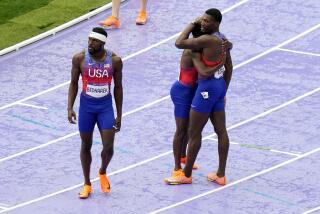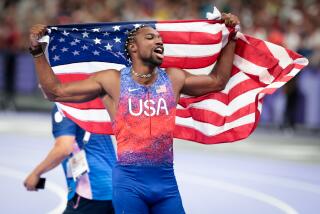29-4 1/2! : Powell Breaks Beamon’s 1968 Long Jump Record and Snaps Lewis’ Streak
TOKYO — It was inevitable that one of the most durable records in sports, Bob Beamon’s long jump of 29 feet 2 1/2 inches in the 1968 Olympic Games at Mexico City, eventually would be broken. It was even predictable, considering the favorable conditions at the National Stadium, that it would happen here in track and field’s World Championships.
But the assumption by the sport’s followers for almost a decade was that when the record finally fell, it would be at the fleet feet of the most consistently excellent performer in the event’s history, two-time Olympic and world champion Carl Lewis.
Instead, the long jump’s first new world record-holder in 23 years is Mike Powell, 27, of Rancho Cucamonga, whose most significant title, other than the one he won in the 1990 National Championships, was as a sporting goods chain’s celebrity slam dunk champion.
“I was 4 years old when (Beamon) got that record, but it feels great to break it because everyone’s been saying that Carl will be the one to do it,” Powell said. “Nobody gave me credit. Not to say, ‘In your face,’ but . . . In your face.”
Powell broke track and field’s oldest record decisively, landing 29 feet 4 1/2 inches after he lifted off in the fifth of six rounds during the long jump final. His record came before a near-capacity crowd in the 62,000-seat stadium on a night of ominous storm clouds, stifling humidity and gusting winds.
Those apparently are ideal atmospheric conditions for long jumping. Not only were they similar to those in Mexico City when Beamon made his historic jump, breaking the previous record by 1 foot 9 3/4 inches, but five of the top seven performances of all time were recorded in this competition.
Four were by Lewis, 30, of Houston, who also surpassed Beamon’s mark with a fourth-round jump of 29-2 3/4, although it would not have counted as a world record because the tail wind of 2.9 meters per second at the time was more than the 2.0 allowable for record consideration.
In putting together the best series ever, Lewis also had jumps of 29-1 1/4, 29-0 and 28-5 3/4 when the wind was 2.0 m.p.s. or less, plus another wind-assisted jump of 28-11 3/4. Before Friday night, only two men, Beamon in 1968 and the Soviet Union’s Robert Emmiyan in 1987, had jumped farther than 29 feet.
Each did it once and at an altitude above 1,000 feet, which because of the thin air, is considered beneficial to long jumpers. Tokyo is at sea level, adding to the luster of the performances by Powell and Lewis.
Larry Myricks, 35, of Upland finished third with a best jump of 27-7 1/2 as he and his U.S. teammates duplicated their sweep of the medals in the 1988 Olympics at Seoul. The difference was that Lewis had to settle for silver this time, perhaps an even more astonishing development than the world record, considering that he arrived in Tokyo with a 10-year, 65-meet winning streak.
There was no indication that Lewis’ streak would end here. He apparently was in peak condition, having broken the world record in the 100-meter dash Sunday with a time of 9.86 seconds. Thursday, he was the leading qualifier among the 12 long jump finalists with a leap of 28-1 and had fouled on another effort that appeared close to eclipsing Beamon’s record.
Seemingly stunned by the defeat, Lewis said Friday: “I had the greatest series of all time. He had just one jump. He may never do it again, but he did it tonight. That’s the long jump. It’s not a series. It’s a jump.”
Powell’s record-breaking jump was almost a foot farther than his personal best of 28-5. He established that in 1990, when he won the national championship and was ranked No. 1 in the world in a year during which Lewis competed in the event only twice, beating Powell both times.
Although he had lost in the 15 other times that they had met since 1983, one area in which Powell has never fallen short of Lewis is in confidence. Even in 1986, when Powell was a relatively unknown senior at UCLA after transferring from UC Irvine, Bob Kersee, the Bruin women’s coach, said Powell talked about beating Lewis.
“Everybody kidded him that he was too dumb to know he couldn’t beat Carl Lewis,” Kersee said.
It still had not sunk in this week.
“After he ran that 9.86 in the 100, I knew he would be ready to jump far,” Powell said. “I didn’t get upset. I just knew I’d have to jump farther.”
Powell said he was so eager to start the competition that he almost hyperventilated before his first jump, a mere 25-9 1/4.
“I was so pumped up, so motivated, that I couldn’t breathe,” he said. “At that point, I said, ‘OK, just relax. You don’t have to be crazy and all psyched up. Just relax and let your body do what it will do.’ ”
Jumping after Powell, Lewis took the lead on his first jump of 28-5 3/4. In the second round, Powell narrowed the margin by going 28-0 1/4, and Lewis fouled. But in the third round, Lewis leaped 28-11 3/4 with a prevailing wind of 2.3 meters per second, and Powell went only 27-2 1/2.
It became more than merely another good competition in the fourth round when Powell finally nailed one, only to be called for a foul. He pleaded with the judge but said later he knew it was a foul and was not upset. To the contrary, he said he knew he had found his form. So, he was not concerned when Lewis responded with the longest jump of all time, a windy 29-2 3/4, which counted in the competition but not as a record.
“When he did that, a lot of people probably thought he was going to win,” Powell said. “But I took it personally. I thought, ‘I’m the best jumper in the world. I was ranked No. 1 in the world last year, and I’m going to win.’ ”
On his next jump Powell soared into the record book.
He ran first to the electronic wind indicator to see whether it was a legal jump for record consideration. It was. The tail wind was 0.3 m.p.s. Then he ran to the scoreboard as it flashed 8.95. That is metric for 29-4 1/2, two inches beyond Beamon’s record. Then Powell ran down the track, thrusting his fists into the air in triumph.
But if anyone should have known the competition was not over, it was Powell. Twice within the last year--in the 1990 Goodwill Games at Seattle and then in this summer’s National Championships at New York--he had led Lewis, only to be overtaken in the last round.
Minutes after watching as the world record he has been chasing since 1982 was broken by someone else, a determined Lewis, on his fifth attempt, jumped 29-1 1/4 into a 0.2-m.p.s. head wind. After Powell fouled on his last jump, he reclined in the infield and waited for the moment that he feared would be the worst of his career.
“I timed it,” he said. “It was 5 minutes and 31 seconds from the time (Lewis) walked onto the runway to the time he jumped. My heart was beating very quickly. I started to feel faint. I thought he was going to beat me. I’ve been so conditioned to seeing him beat me at this point that I thought, ‘Why not?’ I hoped not but, deep down, I thought he had me.”
Not this time. Lewis’ final effort was splendid, particularly considering the pressure he must have felt, but short--29 feet even.
“I still felt I could jump farther, but I didn’t,” Lewis said. “It’s just something I have to accept.”
With the lure of Beamon’s record no longer in front of him, Lewis indicated that he might retire from the long jump to concentrate on sprinting.
“It’s a possibility,” he said.
Powell said he was proud of the world record and the gold medal in the World Championships but was even prouder that he was able to beat Lewis.
“When Carl beat me back in New York at the National Championships in June, I was rather upset,” he said. “But I was talking to my therapist, and she said it was like a heavyweight fight. If you’re going to beat the champion, you can’t beat him on a split decision. You’ve got to knock him out. Tonight, I knocked him out.”
More to Read
Go beyond the scoreboard
Get the latest on L.A.'s teams in the daily Sports Report newsletter.
You may occasionally receive promotional content from the Los Angeles Times.






